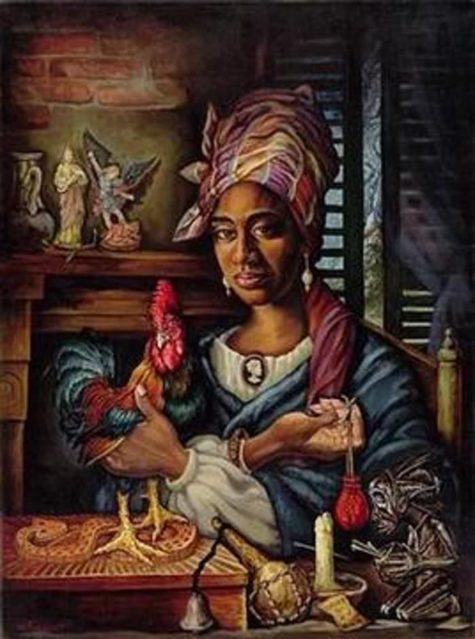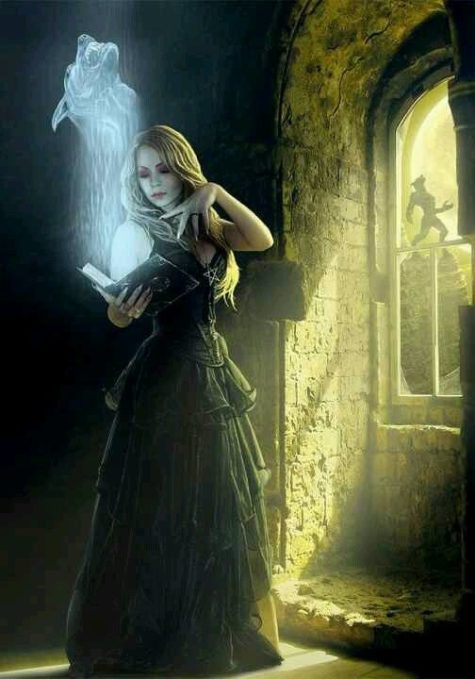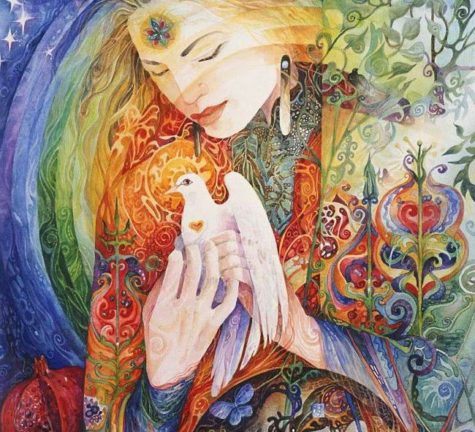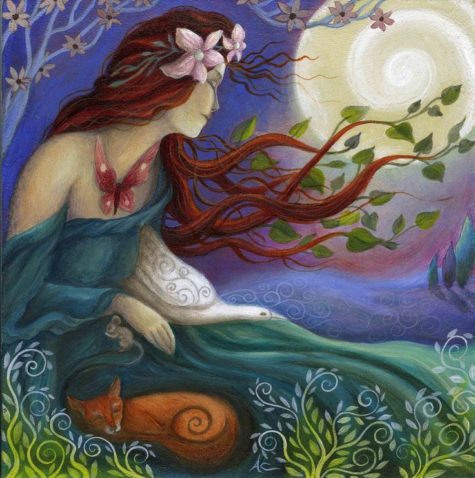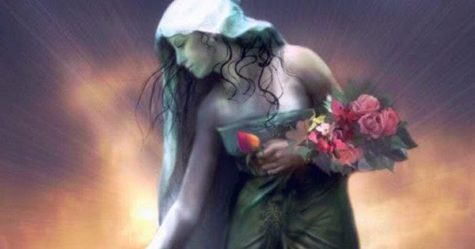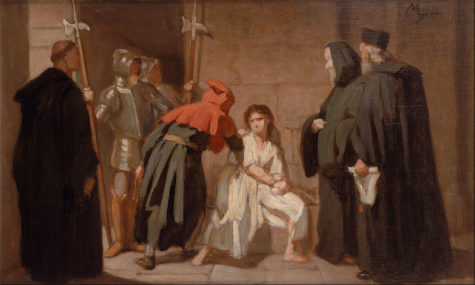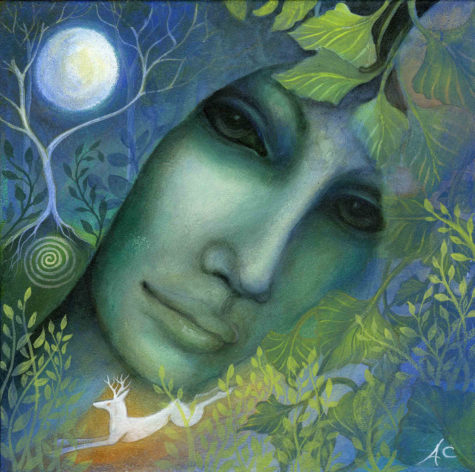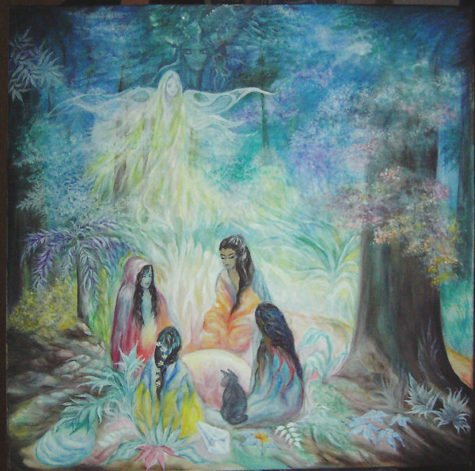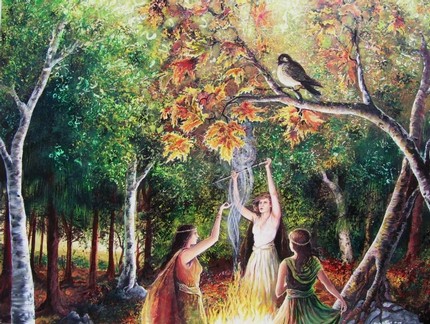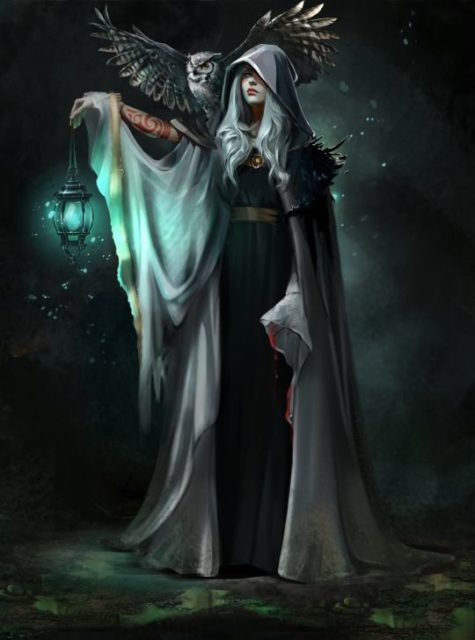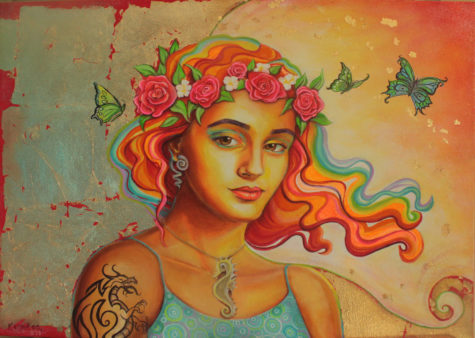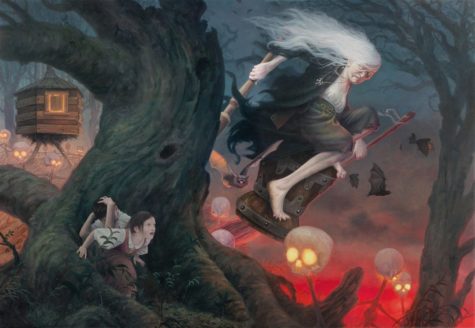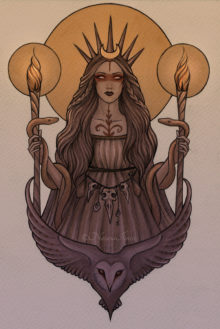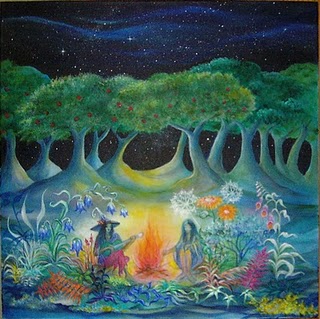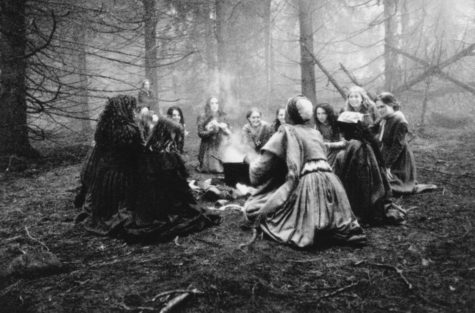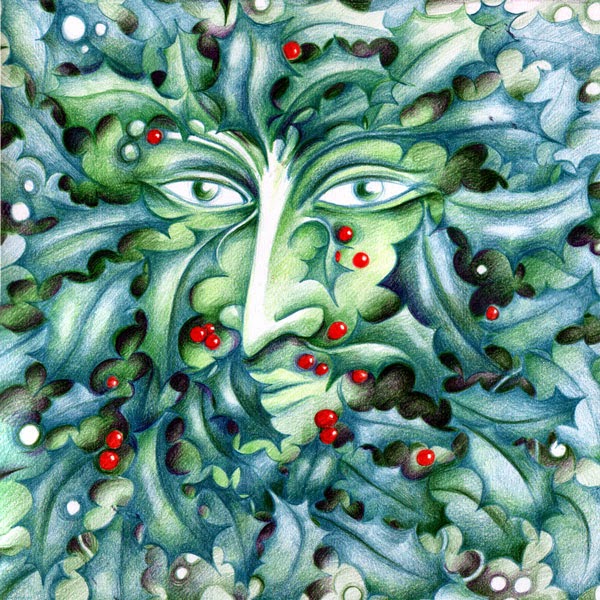Witch
Marie Laveau ~ Voodoo Queen
Now there lived a conjure-lady, not long ago
In New Orleans, Louisiana – named Marie Laveau
Believe it or not, strange as it seem
She made her fortune selling voodoo, and interpreting dreams
She was known throughout the nation as the Voodoo Queen
Folks come to her, from miles and miles around
She sure know how to put that, that voodoo down
To the voodoo lady they all would go
The rich, the educated, the ignorant and the poor
She’d snap her fingers, and shake her head
She’d tell them ’bout their lovers – livin’ or dead
Now an old, old lady named widow Brown
Asked why her lover, stopped comin’ around
The voodoo gazed at her and squawked
I seen him kissin’ a young girl, up at Shakespeare’s Park
Hanging on an oak tree, in the dark
Oh Marie Laveau, Oh Marie Laveau
Oh Marie Laveau, Oh Marie Laveau
Marie Laveau, the Voodoo Queen
From way down yonder in New Orleans
Ya, ya, ya – ya, ya, ya – ya, ya, ya – yaaaaa
Now old, old lady, she lost her speech
Tears start to rollin’ down her checks
Voodoo say, “Hush my darlin don’t you cry,”
I make him come back, by and by
Just sprinkle this snake dust, all over your floor
I’ll make him come back Friday mornin’, when the rooster crow
Now Marie Laveau she held em in her hand
New Orleans, Louisiana was her promised land
Quality folks, come from far and near
This wonder woman, for to hear
They was afraid to be seen, at her gate
They’d creep through the dark, just to hear their fate
Holdin’ dark veils, over their head
They would tremble to hear, what Maria would say
Marie Laveau, Oh Marie Laveau
Marie Laveau, Oh Marie Laveau
Marie Laveau, the Voodoo Queen
From way down yonder in New Orleans
Ya, ya, ya – ya, ya, ya – ya, ya, ya – yaaaaa
And she made gris-gris, with an old ram horn
Stuffed with feathers, shuck from a corn
A big black candle, and a catfish fin
She make a man get religion, and give up his sin
Sad news got out one mornin’, at the break of day
Marie Laveau had done pass away
St. Louis cemetery, she lay in her tomb
She was buried one night, on the wake of the moon
Marie Laveau, Oh Marie Laveau
Oh Marie Laveau, Oh Marie Laveau
The folks still believe, in the Voodoo Queen
From way down yonder in New Orleans
Oh Marie Laveau, Oh Marie Laveau
Oh Marie Laveau, Oh Marie Laveau
Marie Laveau, the Voodoo Queen
From way down yonder in New Orleans
Marie, Marie Laveau, Oh Marie Laveau
Marie Laveau, the Marie Laveau
Marie Laveau, the Voodoo Queen
~Music by Dr John
The Return
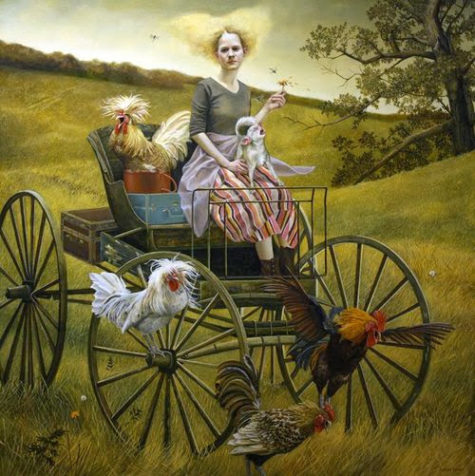
Some day, if you are lucky,
you’ll return from a thunderous journey
trailing snake scales, wing fragments
and the musk of Earth and moon.
Eyes will examine you for signs
of damage, or change
and you, too, will wonder
if your skin shows traces
of fur, or leaves,
if thrushes have built a nest
of your hair, if Andromeda
burns from your eyes.
Do not be surprised by prickly questions
from those who barely inhabit
their own fleeting lives, who barely taste
their own possibility, who barely dream.
If your hands are empty, treasureless,
if your toes have not grown claws,
if your obedient voice has not
become a wild cry, a howl,
you will reassure them. We warned you,
they might declare, there is nothing else,
no point, no meaning, no mystery at all,
just this frantic waiting to die.
And yet, they tremble, mute,
afraid you’ve returned without sweet
elixir for unspeakable thirst, without
a fluent dance or holy language.
- By Geneen Marie Haugen
- Found at Feathers and Bones
A Witchy Werewolf Story
From the book Werwolves, by Elliott O’Donnell, first published in 1912, we have this account of werewolves and witches.
To inflict the evil property of werwolfery upon those against whom they – or some other – bore a grudge was, in the Middle Ages, a method of revenge frequently resorted to by witches; and countless knights and ladies were thus victimized. Nor were such practices confined to ancient times; for as late as the eighteenth century a case of this kind of witchcraft is reported to have happened in the vicinity of Blois.
In a village some three miles from Blois, on the outskirts of a forest, dwelt an innkeeper called Antonio Cellini, who, as the name suggests, was of Italian origin. Antonio had only one child, Beatrice, a very pretty girl, who at the time of this story was about nineteen years of age.
As might be expected, Beatrice had many admirers; but none were so passionately attached to her as Herbert Poyer, a handsome youth, and one Henri Sangfeu, an extremely plain youth. Beatrice – and one can scarcely blame her for it – preferred Herbert, and with the whole-hearted approval of her father consented to marry him.
Sangfeu was not unnaturally upset; but, in all probability, he would have eventually resigned himself to the inevitable, had it not been for a village wag, who in an idle moment wrote a poem and entitled it
“Sansfeu the Ugly; or, Love Unrequited.”
The poem, which was illustrated with several clever caricatures of the unfortunate Henri and contained much caustic wit, took like wildfire in the village; and Henri, in consequence, had a very bad time. Eventually it was shown to Beatrice, and it was then that the climax was reached.
Although Henri was present at the moment, unable to restrain herself, she went into peals of laughter at the drawings, saying over and over again: “How like him – how very like! His nose to a nicety! It is certainly correct to style him Sansfeu – for no one could call him Sansnez!”
Her mirth was infectious; every one joined in; only Henri slunk away, crimson with rage and mortification. He hated Beatrice now as much as he had loved her before; and he thirsted only for revenge.
Some distance from the village and in the heart of the forest lived an old woman known as Mere Maxim, who was said to be a witch, and, therefore, shunned by every one. All sorts of unsavoury stories were told of her, and she was held responsible for several outbreaks of epidemics – hitherto unknown in the neighbourhood – many accidents, and more than one death.
The spot where she lived was carefully avoided. Those who ventured far in the forest after nightfall either never came back at all or returned half imbecile with terror, and afterwards poured out to their affrighted friends incoherent stories of the strange lights and terrible forms they had encountered, moving about amid the trees.
Up to the present Henri had been just as scared by these tales as the rest of the villagers; but so intense was his longing for revenge that he at length resolved to visit Mere Maxim and solicit her assistance. Choosing a morning when the sun was shining brightly, he screwed up his courage, and after many bad scares finally succeeded in reaching her dwelling – or, I might say, her shanty, for by a more appropriate term than the latter such a queer-looking untidy habitation could not be described.
To his astonishment Mere Maxim was by no means so unprepossessing as he had imagined. On the contrary, she was more than passably good-looking, with black hair, rosy cheeks, and exceedingly white teeth. What he did not altogether like were her eyes – which, though large and well shaped, had in them an occasional glitter – and her hands, which, though remarkably white and slender, had very long and curved nails, that to his mind suggested all sorts of unpleasant ideas.
She was becomingly dressed in brown – brown woolly garments, with a brown fur cap, brown stockings, and brown shoes ornamented with very bright silver buckles. Altogether she was decidedly chic; and if a little incongruous in her surroundings, such incongruity only made her the more alluring; and as far as Henri was concerned rather added to her charms.
At all events, he needed no second invitation to seat himself by her side in the chimney-corner, and his heart thumped as it had never thumped before when she encouraged him to put his arm round her waist and kiss her. It was the first time a woman had ever suffered him to kiss her without violent protestations and avowals of disgust.
“You are not very handsome, it is true,” Mere Maxim remarked, “but you are fat – and I like fat young men,” and she pinched his cheeks playfully and patted his hands. “Are you sure no one knows you have come to see me?” she asked.
“Certain!” Henri replied; “I haven’t confided in a soul; I haven’t even so much as dropped a hint that I intended seeing you.”
“That is good!” Mere Maxim said. “Tell no one, otherwise I shall not be able to help you. Also, on no account let the girl Beatrice think you bear her animosity. Be civil and friendly to her whenever you meet; then give her, as a wedding present, this belt and box of bonbons.”
So saying, she handed him a beautiful belt composed of the skin of some wild animal and fastened with a gold buckle, and a box of delicious pink and white sugarplums. “Do not give her these things till the marriage eve,” she added, “and directly you have given them come and see me – always observing the greatest secrecy.”
She then kissed him, and he went away brimming over with passion for her, and longing feverishly for the hour to arrive when he could be with her again.
All day and all night he thought of her – of her gay and sparkling beauty, of her kisses and caresses, and the delightful coolness of her thin and supple hands. His mad infatuation for her made him oblivious to the taunts and jeers of the villagers, who seldom saw him without making ribald allusion to the poem.
“There goes Sansfeu! alias Monsieur Grosnez!” they called out. “Why don’t you cut off your nose for a present to mademoiselle? She would then have no need to buy a kitchen poker. Ha! ha! ha!”
But their coarse wit fell flat. Henri hardly heard it – all his thoughts, his burning love, his unquenchable passion, were centred in Mere Maxim: in spirit he was with her, alone with her, in the innermost recesses of the grim, silent forest.
The marriage eve came; he handed Beatrice the presents, and ere she had time to thank him – for the magnificence of the belt rendered her momentarily speechless – he had flown from the house, and was hurrying as fast as his legs could carry him to his tryst.
The shadows of night were already on the forest when he entered it; and the silence and solitude of the place, the indistinct images of the trees, and their dismal sighing, that seemed to foretell a storm, all combined to disturb his fancy and raise strange spectres in his imagination. The shrill hooting of an owl, as it rustled overhead, caused him an unprecedented shock, and the great rush of blood to his head made him stagger and clutch hold of the nearest object for support.
He had barely recovered from this alarm when his eyes almost started out of their sockets with fright as he caught sight of a queer shape gliding silently from tree to tree; and shortly afterwards he was again terrified – this time by a pale face, whether of a human being or animal he could not say, peering down at him from the gnarled and fantastic branches of a gigantic oak.
He was now so frightened that he ran, and queer – indefinably queer footsteps ran after him, and followed him persistently until he reached the shanty, when he heard them turn and leap lightly away.
On this occasion, the occurrence of Henri’s second visit, Mere Maxim was more captivating than ever. She was dressed with wonderful effect all in white. She wore sparkling jewels at her throat and waist, buckles of burnished gold on her shoes; her teeth flashed like polished ivory, and her nails like agates. Henri was enraptured. He fell on his knees before her, he caught her hands and covered them with kisses.
“How nice you look to-day, my sweetheart,” she said; “and how fat! It does my heart good to see you. Come in, and sit close to me, and tell me how you have fared.”
She led him in, and after locking and barring the door, conducted him to the chimney-corner. And there he lay in her arms. She fondled him; she pressed her lips on his, and gleefully felt his cheeks and arms. And after a time, when, intoxicated with the joy of it all, he lay still and quiet, wishing only to remain like that for eternity, she stooped down, and, fetching a knot of cord from under the seat, began laughingly to bind his hands and feet.
And at each turn and twist of the rope she laughed the louder. And when she had finished binding his arms and legs she made him lie on his back, and lashed him so tightly to the seat that, had he possessed the strength of six men, he could not have freed himself.
Then she sat beside him, and moving aside the clothes that covered his chest and throat, said: –
“By this time Beatrice – pretty Beatrice, vain and sensual Beatrice, the Beatrice you once loved and admired so much – will have worn the belt, will have eaten the sweets. She is now a werwolf.
Every night at twelve o’clock she will creep out of bed and glide about the house and village in search of human prey, some bonny babe, or weak, defenseless woman, but always some one fat, tender, and juicy – some one like you.”
And bending low over him, she bared her teeth, and dug her cruel nails deep into his flesh. A flame from the wood fire suddenly shot up. It flickered oddly on the figure of Mere Maxim – so oddly that Henri received a shock. He realized with an awful thrill that the face into which he peered was no longer that of a human being; it was – but he could no longer think – he could only gaze.
The Story of Aradia
‘Diana was the first created before all creation; in Her were all things; out of Herself, the First Darkness, She divided herself; into Darkness and Light She was divided.Lucifer, Her brother and son, Herself and Her other half, was the Light.
Diana greatly loved Her brother, Lucifer, the God of the Sun and of the Moon, the God of Light (Splendour). Diana had by Her brother, a Daughter, to whom they gave the Name of Aradia.
Aradia was a child of the Spirit. And even in Her youth She heard the voices that only the Ancients once knew.
In the early hours of the dawn, she walked among the Alban hills near Lake Nemi. One day, after having journeyed far into the hills, she grew tired and took her rest beneath the shade of a large tree.
As she centered her thoughts within her mind, a voice spoke to her, saying:
‘ Look well into the skies,
and know that you are chosen.’
Aradia gazed upwards, the skies darkened, and the voice whispered to her the words
‘Moon Shadow’
Something within her awoke, and she understood the path that lay ahead of her. Looking about from the hillside, she saw the beauty of creation and the equality of all things.
An understanding of the inner workings of Nature arose within her and with this enlightenment she opened up her heart and mind to the vastness of all she perceived.
Then Aradia beheld the oppression of the peasant people; knew their sorrows and was greatly moved with compassion.
In the time of Aradia, many peasant slaves had escaped into the hills and forests.These people gathered into bands of outlaws in order to survive. Aradia sought them out, living with them for a period of time in the woodland camps near Lake Nemi. There she listened to the plight of the people.
Many suffered persecution from the Church because they worshiped in the Old Ways. Others were made slaves by evil Lords who held power in the land. Among these outlaws Aradia came to know many Witches who were also in hiding.
In time, Aradia went down into the villages and towns in order to give hope to the people. She taught them saying:
‘Blessed Be the free. Blessed be they who rejoice in Truth and Love, and seek not to maintain evil and misguided teachings. Know that the Spirit is upon you all, and that spirit is love.
Love punishes not, neither a day nor an eternity. Do not lend yourselves to teachings of fear and restriction.
Blessed be the free in spirit for their kingdom is of both worlds. They are the children of the Earth who neither hate nor teach hate, fear nor teach fear, restrict nor teach restriction.
These same are the children of Spirit.’
Aradia gathered her disciples and taught them the inner mysteries of the Old Ways, the inner mysteries of the Old Ways that their Ancestors once embraced.
She revealed the true nature of the Name Aradia, taken in honor of the historical daughter of Diana. Many people knew Aradia in her home town of of Volterra, and in Benevento, before she took this name. Her fame soon spread to all regions of Italy; people came to listen to the words of Aradia and to join her as followers.
She taught them the doctrine of reincarnation, and about the old gods. Aradia revealed the secret of the Earth and the knowledge of the ancient teachings.
Because of her fame, she fell into disfavor with the church, and the priests plotted against her. Soldiers were sent to arrest her for heresy, and she was placed inside a prison. There, Aradia suffered humiliation and torture. The officials feared her popularity amongst the peasants and desired to sentence her to death.
When morning arrived on the day the priests were to meet, they ordered Aradia be brought before them, but she was not to be found in her cell. A search began for her, but she could not be located anywhere in the region.
Later, in the south of Rome, Aradia appeared again and continued to teach. The people were amazed because they believed she had been killed or imprisoned for life. Hearing the news of her appearance in Rome, the soldiers came to retrieve her. But none questioned by the soldiers knew anything about Aradia.
After the soldiers departed, the priests sent spies to dwell amongst the peasants in hopes of discovering her whereabouts.In that same month some people discovered Aradia sitting with her disciples and instructing them. Aradia saw that they were joyful to encounter her, and she spoke to them saying:
‘Blessed be the free in Spirit and they who love without profit. For love is the greatest attainment. It is the gift of the Spirits’ blessing. Therefore never betray a love, nor deceive one.
Love each other and care for each other, and for each thing, with the heart and soul of a poet
Strive to see the world as does the artist. Go, seek, and capture the beauty which is there. And take care that you hurt not even one which is among you,
But love, and live to the fullest, in awareness and compassion to the minds and hearts and souls of everyone around you. Live in peace’
Many people began to question themselves concerning Aradia. Her disciples came to her and said, ‘My Lady, some say you are a prophetess, and some say you are a magus. What shall we tell them?
Aradia picked up a handful of earth and looking at the crowd, she said:
‘I am the Daughter of the Sun and of the Moon. I am the earth.
I am the love of freedom, which is the love of the Gods. And whosoever shall believe in me, the same shall be a child of the Mother and Father who dwell in all things.’
A spy from the church approached and said: ‘ Lady, we know that you are a holy one: Tell us of the God from which your power comes.’
Aradia replied :
‘ Though men shall call upon many gods, there is but one, which is the many.
A man is called in his life by many names. Some may know him as father, or friend. To some he may be an enemy or a brother, and to another a cousin. Yet, is he still not one?
Another spy asked her: ‘The priests tell us that god is male, and that women must submit. What do you say?
Aradia answered:
‘Does not even Nature show you, in all ways, that all is equal? In all Flora and Fauna, there is male and female. Who among you can truly say which is more important? One cannot be without the other.’
After this a disciple asked: ‘Lady, if all you speak to us is so, then why do the priests not tell us?
Aradia replied:
‘ The priests tell us what they have been told. It is with they who have been above the priests that the Truth is known and hidden. There are many greedy and power-hungry men who profit from the church. It is better for them, to control with false teachings that restrict and threaten independence from the priesthood.’
The spies returned to the priests and reported what they had heard. The priests were angry and spread lies concerning Aradia’s teachings,claiming they were evil.
After Aradia and her disciples had left the area the soldiers came again, hoping to arrest her. On the road they surrounded Aradia and her followers, taking her into custody.
As they traveled back to Rome, a band of outlaws approached them. The leader was a slave whom Aradia had converted to Moon worship in the Cult of Diana.
A fight resulted in which Aradia was freed and taken by the outlaws to a hiding place. The outlaws escorted Aradia and her followers to a campo in the forest. There she chose twelve of her disciples, six male and six female, and took them into a clearing in order to instruct them.
Aradia spoke to them :
‘With you I now re-establish the Old Religion. Know that there are others who still worship in the ways of their Ancestors. Seek them out and tell them the Mother is with Child, and they will understand my meaning.
Seek out also they who will come to follow us.’
The disciples asked her: ‘Who is this child? Tell us of her.’
Aradia answered:
‘ The infant is the child of Mother Earth. She shall be known as that which is reason and wisdom. She shall come to the world and deliver all people of all nations from the rule of Kings and authorities.
In this Age of the Daughter great changes shall occur such as the world has never known. This shall be a time of renewal.’
Her disciples asked her: ‘ When shall this occur?’
She told them:
‘The dawning of the Age will be signaled by the Will of the Daughter. Her words shall be heard among the words of men. Then women will walk in the ways of men, and the law shall know no difference. When this occurs, the Age has begun.
And my prophet shall then restore my teachings, making ready the dawn of the Age for She who will come.
And in the year of this prophet’s birth there will be a sign for which all witches may rejoice. For this year shall be the rebirth of the Old Religion.’
Aradia spoke further:
’ Yet before this time there shall be death among our people. The time is near when my followers shall be taken before the courts and they shall prosecute you. But the Age of the Son shall draw to an end, giving way to the Age of the Daughter.
You have heard the priests tell you of hell and damnation. But I say to you, believe not in such things. For the Spirit of the Great One is Love, and love damns not, but blesses. For a fathers’ and a Mother’s love does not forget the child, nor does it put one child away and keep the other.’
All that day Aradia instructed her disciples and answered their questions. She taught them the secrets of magick and the knowledge of ritual.
Aradia and her disciples went again out into the towns and villages in order for her to heal the sick and teach the Old Religion, even though they were concerned over their safety. Soldiers, accompanied by several priests, came to arrest her. Realizing she was trapped, Aradia looked upon them sternly, saying :
‘ I rebuke you and cast you out from the people because you teach punishment and shame to those who would free themselves from the slavery of the Church.
These symbols and apparel of authority which you bear serve only to hide the nakedness in which we all are equal. You say you serve your God, but you only serve your own fears and restrictions.’
The soldiers seized her, even though many people tried to protect her. Her disciples fled to avoid being captured themselves. In the town of Benevento they took refuge among the followers of Aradia already living there.
Aradia was put into prison and was condemned for heresy and treason.
While in prison a certain guard was very moved by her beauty and charm. Aradia allowed him to come to her as a lover. On the eve of the execution, Aradia persuaded him to take her into the courtyard so she could pray out in the open.
Two other guards overlooked the courtyard as she prayed. After she finished, a storm gathered and the guard told Aradia to return to her cell.
As she complied, the storm crashed over them with great fury. An earthquake shook the ground and the buildings fell, stone by stone. When calm returned at last, only a few people were found alive. Word spread far and wide that Aradia had perished.
Seven days later, Aradia appeared in the camp of the forest outlaws; everyone was amazed to see her because it was reported that she had died.
Aradia would not speak to them concerning this, and she gathered together these disciples who still followed her and left the forest.They journeyed into the hills near Nemi. When they had settled for the night, Aradia came to them and said:
‘The time is marked, and I shall remain with you for but a short while longer.’
Aradia marked a circle upon the ground spanning nine paces from the center. She gathered her disciples into the circle and formally instructed them.
Following this, Aradia addressed them:
‘When you have need of anything, gather then in secret when the Moon is full and worship the Spirit of the Queen of Witches; The Queen of All Witches.
Gather yourselves within the circle of the Arts, and secrets that are as yet unknown shall be revealed.
And as a sign that you are truly free, you shall be naked in your rites, for such is the essence of Spirit and joy upon the Earth.
And your Law shall be,
Love Unto All.
Be true to your own beliefs.
Keep to your own ways beyond all obstacles.
For ours is the key to the Mysteries and the cycle of rebirth, which opens the door to the womb of enlightenment.
I am the spirit of all witches, which is joy and peace, and harmony. In life does the Queen of All Witches reveal the knowledge of Spirit. And from Death does the Queen deliver you unto peace and renew your life again.’
Aradia next taught her disciples about the secrets of the circle. She spoke of the gods and the Old Ones, known as the Grigorii (Watchers) ~ She taught them all types of enchantments, signs in the sky, and of the seasons.
When Aradia had revealed these things to her disciples, she told them:
‘In memory of me you shall eat cakes of grain, wine, salt and honey. These shall you shape like the crescent of the Moon. Then shall you bless them in my name and partake of them upon your sacred gatherings.
As of old, you shall hold sacred the first day of May and of August and also the Eve of November, which is the Time of Shadows. Of February shall you observe it’s second day. Also shall you observe the Solstices of midsummer and midwinter and the Equinoxes of Spring and Autumn.
To all those who observe these sacred times will the Queen of Heaven give the power. And you shall enjoy success in love. And you shall have the power to bless, and the power to consecrate. And you shall know the tongue of Spirits, Obtain knowledge of hidden things, And raise forth the spirits from beyond the void.
You shall understand the voice of the wind, And the knowledge of the changing of forms. To you shall the future be known, and secret signs revealed. And you shall have the power to cure disease, and bring forth beauty. Wild beasts shall know you and cause you no harm.
Know that the power is gained through knowledge and that the knowledge is gained through understanding. Know therefore that you must understand the balance. Everything which lives is of male and female essence. Do not exalt the one above the other. Come to know both, to be complete.
Blessed Be the free in spirit. When you hate, or despair, or do not understand it is because you are not in balance with your surroundings. I do not speak of masculine or feminine, but of elements and causes and forces.
Seek first the Balance, then you will understand, and understanding you will overcome what you must.’
Aradia stood in the midst of her disciples and spoke:
‘ My purpose is firmly set forth, and to you I now give the power. In my Name shall you go forth and teach the ways of freedom and magick.’
Aradia let her garments fall, fully revealing herself to her disciples. She took one of them by the hand and brought him beside her on the ground.
There upon the sacred Earth, beneath the star-filled night, they were joined in love. After this, each disciple was joined to the other. In this way, the power passed in love amongst the followers of Aradia.
It was early morning when the disciples gathered again to hear Aradia speak. She said to them :
‘ With you I now establish a covenant, between you and me and likewise to all who shall come to follow in the ways.’
Aradia then placed a scroll into the hands of the disciples upon which were written thirteen laws.
She also gave them nine sacred scrolls that she had written. This was the foundation of all the teachings that she had come to teach.
Aradia spoke again to her disciples:
‘Soon you shall go forth among they who dwell outside of the ways.
And you shall meet ignorance, fear and misunderstanding. Therefore, protect yourselves in all ways. And you shall come across many who truly wish to seek to be at one with the Nature of all things.
Teach all whom you find sincere and truly worthy. Yet take care that you do not become judgmental. Keep your own manner of being separate and do not expect everyone to be a likeness of yourself.
Show love and warmth to all persons for if you do not many will turn away from you. How then shall you serve the ways?
Know that your first allegiance is to the God and Goddess. Your second allegiance is to the Old Ways, and the third is to Witches all.
If you serve yourself you do not serve. When you serve your own self-importance you are out of balance with Nature, for in Nature, all things are equal ~ nothing is more important than any other thing.
And yet, all living things have the right to do what they must to survive. Who can speak against the order of things?
Therefore, live your life as you must according to the laws which I have given you. Enjoy each day and long not for the next. The only certainty, is now.
Do not become bitter or cold at the seeming harshness and unfairness of life, for love has the power to overcome all things.
Nothing lasts forever and nothing remains the same, for everything is even now moving towards that which it will become.
Therefore I tell you to observe the cycles of everything within you and outside you.’
It was her practice to teach her disciples in this manner. As the time for instruction was almost completed one of the disciples asked Aradia to speak again of the coming Age.
Aradia told them:
‘ The Age of the Daughter is the final age to dawn upon Earth. The first Age was of the Mother, when all people worshiped the Great Goddess. The second Age was that of the Father and the third Age is the Son.
Under the Mother there arose all Goddesses and their cults. With the Age of the Father arose the gods which would then come to dominate the female cults. It was then that the warrior cults began to rule the world. From this Age rose the Christ Spirit, but men clung to their stern Father God.
Now when the Age of the Daughter shall come, then shall reason be restored and the world shall be in balance.
To herald the coming of the Daughter and to keep it remembered upon the earth, every two hundred years there shall arise a prophet.
This prophet shall be a great teacher, and shall give life to the Old Religion. When the Age of the Daughter grows near, there shall be an awakening in the awareness of women, and their will shall be asserted.
Laws will then change and women shall walk in the ways of men. And there shall be a time when the last of the laws which persecute and suppress us shall be removed.
In that year, all Stregheria shall rejoice.
When the Age of the Daughter begins to replace that of the Son, then shall she appear who is to establish reason; and she will be thirty-six at this time. And she shall come in power, for the silent prophet will have established the way.
As this Age progresses, great trial and tribulation shall befall the people of all nations. And out of the ashes, shall arise the new world of reason. People shall no longer be ruled by governments, nor shall one people oppress another.
There shall be no rulers, but teachers and counselors. No-one shall possess power over another, nor shall anyone restrict or control another person.
The earth will be of one people and they will all live under the emanating rays of love, peace and reason.’
All that day and into the evening Aradia spoke of future events. The next day her disciples departed as instructed, in pairs of male and female to teach others the Gospel of Aradia. She had bid them farewell and directed them to go out into all the towns and villages.
In the days that followed, the fame of Aradia and her wisdom and her beauty went forth all over the land. People began to worship her, calling her the Beautiful pilgrim.
There were those who said She was The Goddess in human form.
The disciples traveled with a heavy heart, for Aradia had spoken of the times to come. They carried with them the thought of the many centuries that were to pass before the promised Age would dawn.
After travelling from village to village, the disciples returned to the village of Benevento. There they gathered the covens of Aradia which she had favored. The disciples taught them each the final words which Aradia had spoken and they shared the knowledge of the sacred scrolls with them. The followers of Aradia gathered into Clans and a covenant was established at this time in order to unite the clans in the Old ways.
These groups then departed to distant places, concerned at the possibility of further prosecution by the enemies of Aradia. However, there were those followers of Aradia who would not depart.
Aradia was not seen again by the people of that region. But Her followers remembered Her teachings, and gathered and celebrated as the Holy One had bid them, even as they do to this very day.
Here ends the Gospel of the Holy Strega.
Source: Temple Illuminatus
The Witch-Cat of the Ozarks
A drunken braggart accepted a dare to sleep in a house that had once been used by witches. At midnight, when he had finished his jug of whisky and was just beginning to fall asleep, an enormous cat suddenly appeared.
It howled and spat at him, so he shot at it with his hunting gun and, though it escaped, he was certain he had shot one of its paws clean off. At that moment a woman’s scream was heard in the distance, and just as the candle went out, the man saw a woman’s bare and bloody foot wriggling around on the table.
The following day he learned that a woman who lived nearby had accidentally shot her foot off and had died from loss of blood. It is said that she died howling and spitting like a cat.
Found at: Moggycats Cat Pages
Baba Yaga and the Twins
Somewhere, I cannot tell you exactly where, but certainly in vast Russia, there lived a peasant with his wife and they had twins — a son and daughter. One day the wife died and the husband mourned over her very sincerely for a long time. One year passed, and two years, and even longer. But there is no order in a house without a woman, and a day came when the man thought, “If I marry again possibly it would turn out all right.” And so he did, and had children by his second wife.
The stepmother was envious of the stepson and daughter and began to use them hardly. She scolded them without any reason, sent them away from home as often as she wished, and gave them scarcely enough to eat. Finally she wanted to get rid of them altogether. Do you know what it means to allow a wicked thought to enter one’s heart?
The wicked thought grows all the time like a poisonous plant and slowly kills the good thoughts. A wicked feeling was growing in the stepmother’s heart, and she determined to send the children to the witch, thinking sure enough that they would never return.
“Dear children,” she said to the orphans, “go to my grandmother who lives in the forest in a hut on hen’s feet. You will do everything she wants you to, and she will give you sweet things to eat and you will be happy.”
The orphans started out. But instead of going to the witch, the sister, a bright little girl, took her brother by the hand and ran to their own old, old grandmother and told her all about their going to the forest.
“Oh, my poor darlings!” said the good old grandmother, pitying the children, “my heart aches for you, but it is not in my power to help you. You have to go not to a loving grandmother, but to a wicked witch. Now listen to me, my darlings,” she continued; “I will give you a hint: Be kind and good to every one; do not speak ill words to any one; do not despise helping the weakest, and always hope that for you, too, there will be the needed help.”
The good old grandmother gave the children some delicious fresh milk to drink and to each a big slice of ham. She also gave them some cookies—there are cookies everywhere—and when the children departed she stood looking after them a long, long time.
The obedient children arrived at the forest and, oh, wonder! there stood a hut, and what a curious one! It stood on tiny hen’s feet, and at the top was a rooster’s head. With their shrill, childish voices they called out loud: “Izboushka, Izboushka! turn thy back to the forest and thy front to us!”
The hut did as they commanded. The two orphans looked inside and saw the witch resting there, her head near the threshold, one foot in one corner, the other foot in another corner, and her knees quite close to the ridge pole.
“Fou, Fou, Fou!” exclaimed the witch; “I feel the Russian spirit.”
The children were afraid, and stood close, very close together, but in spite of their fear they said very politely: “Ho, grandmother, our stepmother sent us to thee to serve thee.”
“All right; I am not opposed to keeping you, children. If you satisfy all my wishes I shall reward you; if not, I shall eat you up.”
Without any delay the witch ordered the girl to spin the thread, and the boy, her brother, to carry water in a sieve to fill a big tub. The poor orphan girl wept at her spinning-wheel and wiped away her bitter tears. At once all around her appeared small mice squeaking and saying:
“Sweet girl, do not cry. Give us cookies and we will help thee.”
The little girl willingly did so.
“Now,”gratefully squeaked the mice, “go and find the black cat. He is very hungry; give him a slice of ham and he will help thee.”
The girl speedily went in search of the cat and saw her brother in great distress about the tub, so many times he had filled the sieve, yet the tub was still dry. The little birds passed, flying near by, and chirped to the children:
“Kind-hearted little children, give us some crumbs and we will advise you.”
The orphans gave the birds some crumbs and the grateful birds chirped again: “Some clay and water, children dear!”
Then away they flew through the air.
The children understood the hint, spat in the sieve, plastered it up with clay and rilled the tub in a very short time. Then they both returned to the hut and on the threshold met the black cat. They generously gave him some of the good ham which their good grandmother had given them, petted him and asked: “Dear Kitty-cat, black and pretty, tell us what to do in order to get away from thy mistress, the witch?”
“Well,” very seriously answered the cat, “I will give you a towel and a comb and then you must run away. When you hear the witch running after you, drop the towel behind your back and a large river will appear in place of the towel.
If you hear her once more, throw down the comb and in place of the comb there will appear a dark wood. This wood will protect you from the wicked witch, my mistress.”
Baba Yaga came home just then.
“Is it not wonderful?” she thought; “everything is exactly right.”
“Well,” she said to the children, “today you were brave and smart; let us see to-morrow. Your work will be more difficult and I hope I shall eat you up.”
The poor orphans went to bed, not to a warm bed prepared by loving hands, but on the straw in a cold corner. Nearly scared to death from fear, they lay there, afraid to talk, afraid even to breathe. The next morning the witch ordered all the linen to be woven and a large supply of firewood to be brought from the forest.
The children took the towel and comb and ran away as fast as their feet could possibly carry them. The dogs were after them, but they threw them the cookies that were left; the gates did not open themselves, but the children smoothed them with oil; the birch tree near the path almost scratched their eyes out, but the gentle girl fastened a pretty ribbon to it. So they went farther and farther and ran out of the dark forest into the wide, sunny fields.
The cat sat down by the loom and tore the thread to pieces, doing it with delight. Baba Yaga returned.
“Where are the children?” she shouted, and began to beat the cat. “Why hast thou let them go, thou treacherous cat? Why hast thou not scratched their faces?”
The cat answered: “Well, it was because I have served thee so many years and thou hast never given me a bite, while the dear children gave me some good ham.”
The witch scolded the dogs, the gates, and the birch tree near the path.
“Well,” barked the dogs, “thou certainly art our mistress, but thou hast never done us a favor, and the orphans were kind to us.”
The gates replied: “We were always ready to obey thee, but thou didst neglect us, and the dear children smoothed us with oil.”
“The children ran away as fast as their feet could possibly carry them.”
The birch tree lisped with its leaves, “Thou hast never put a simple thread over my branches and the little darlings adorned them with a pretty ribbon.”
Baba Yaga understood that there was no help and started to follow the children herself. In her great hurry she forgot to look for the towel and the comb, but jumped astride a broom and was off. The children heard her coming and threw the towel behind them. At once a river, wide and blue, appeared and watered the field. Baba Yaga hopped along the shore until she finally found a shallow place and crossed it.
Again the children heard her hurry after them and so they threw down the comb. This time a forest appeared, a dark and dusky forest in which the roots were interwoven, the branches matted together, and the tree-tops touching each other. The witch tried very hard to pass through, but in vain, and so, very, very angry, she returned home.
The orphans rushed to their father, told him all about their great distress, and thus concluded their pitiful story: “Ah, father dear, why dost thou love us less than our brothers and sisters?”
The father was touched and became angry. He sent the wicked stepmother away and lived a new life with his good children. From that time he watched over their happiness and never neglected them any more.
How do I know this story is true? Why, one was there who told me about it.
From:
Folk Tales From the Russian, by Verra Xenophontovna Kalamatiano de Blumenthal, (1903)
Queen of Ghosts
Queen of Ghosts,
Images of you on gate posts,
Highest priestess.
In the darkest dress.
Crowning a mare,
In the underworld Lair,
A hound at your side,
The serpent around your arm in a bind.
Protecting homes.
As the ghost spirit roams,
Ghostly hounds,
With your spirit crown.
Master of Magic,
Your death tragic,
Patron of Witches,
At your side two bitches,
Protecting from spirits,
When pleased you grant it,
Dark Magician,
Your priestess Medicean.
Witch’s Rune Traditional
Darksome night and silvery moon
East then south then west then north
To thee we sing a witch’s tune
To call the ancient powers forth
Cup for water, airy sword
A pentacle to touch the earth
Fiery wand all in accord
Lady guide us to rebirth
Cord and censer, scourge and knife
Power of the witch’s blade
Waken all ye into life
Come ye as the charm is made
Queen of heaven, queen of hell
Ancient huntress of the night
Listen as we sing this spell
All love and pleasures are your rites
By all the powers of land and sea
By the light of moon and sun
As I will, so mote it be
Chant this spell, so be it done.
From: The Pagan Library
The Witch’s Tune
This is another version of the Witch’s Rune, called the witch’s tune. The words were adapted by Aldan.
Dark of night and rising moon,
East, then south, then west, then north
To each we sing a witches’ tune
That calls the ancient powers forth.
Cup for water, fiery sword,
A pentacle to touch the earth,
Airy wand, all in a cord;
Lady, guide us to rebirth.
White for birth, and green for life.
And black for all the worlds between,
Cauldron, censor, scourge and knife
All celebrate the triple queen.
Queen of heaven, earth and hell
Ancient hunter of the night,
Join us as we sing this spell:
All love and pleasure are her rites.
By all the powers of land and sea,
By all the might of moon and sun,
As I will, so mote it be:
Chant the spell, and be it done.
From: The Pagan Library
The Coven Chant
O ancient ones of heaven, earth and sea,
We chant the coven spell, thus shall it be!
To music of the night-wind blowing free,
We chant the coven spell, thus shall it be!
The owl hoots within the hollow tree,
The black cat runs by night silently,
The toad beneath the stone dwells secretly,
We chant the coven spell, thus shall it be!
To moon that draws the tides of air and sea,
We chant the coven spell, thus shall it be!
To god that bides beneath the greenwood tree,
We chant the coven spell, thus shall it be!
By witches’ garter bound about the knee,
By staff and cauldron and all powers that be,
We will the thing in our minds we see,
We chant the coven spell, thus shall it be!
(Pause…)
The Spell is flowing like the sea,
The spell is growing like the tree,
Like flame that burns and blazes free.
We chant the spell, thus shall it be!
We chant the spell, thus shall it be!
We chant the spell, thus shall it be!
IT IS!
From: Witchcraft for Tomorrow
Yānā Moon: Charge of the Dark Goddess
James Cheney: Invocation To The Dark Mother
Daniel: Prayer Before The Final Battle
blessed obyno: Queen of Ghosts
blessed obyno: Queen of Ghosts
